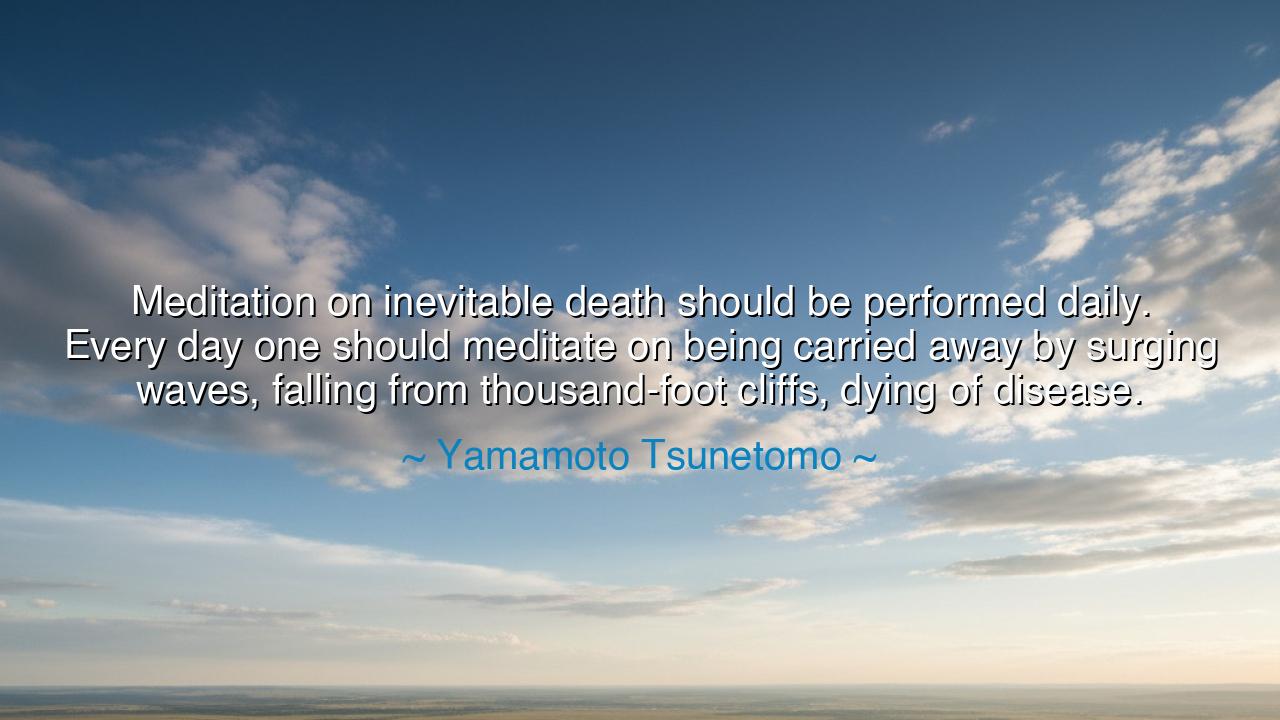
Meditation on inevitable death should be performed daily. Every
Meditation on inevitable death should be performed daily. Every day one should meditate on being carried away by surging waves, falling from thousand-foot cliffs, dying of disease.






“Meditation on inevitable death should be performed daily. Every day one should meditate on being carried away by surging waves, falling from thousand-foot cliffs, dying of disease.” Thus wrote Yamamoto Tsunetomo, the samurai philosopher and author of the Hagakure, that ancient book of the warrior’s spirit. These are not the words of despair, but of discipline and clarity—the voice of one who has stared into the face of death and found not fear, but freedom. Tsunetomo’s teaching belongs to the Bushidō, the Way of the Warrior, where to live well one must learn to die well. For to meditate on death daily is not to invite darkness into one’s soul, but to cleanse it of illusion.
The origin of this quote comes from the Hagakure, written in early 18th-century Japan, long after the great battles of the samurai age had faded into history. Yamamoto Tsunetomo, having served as a retainer to the Nabeshima clan, had withdrawn into seclusion after the death of his lord. In solitude, he reflected on the nature of loyalty, honor, and mortality. To him, the essence of a warrior’s life was to accept death fully and without hesitation. “Meditation on inevitable death,” he wrote, was not morbid fascination, but training for courage—a daily practice that burned away fear, leaving only resolve.
When Tsunetomo speaks of being “carried away by surging waves” or “falling from thousand-foot cliffs,” he invokes the imagery of nature’s uncontrollable power, reminding us that life is fragile and uncertain. One may die in storm or sickness, by sword or silence. By imagining death each day, the samurai does not despair—he awakens. He learns to greet the morning with serenity, to walk the world lightly, for he knows that nothing—neither insult, nor loss, nor pain—can truly harm the one who has already accepted the end. This practice is the root of fearlessness, for death loses its sting when it becomes a familiar companion rather than a terrifying stranger.
Consider, O listener, the example of Miyamoto Musashi, the great swordsman who fought more than sixty duels and never lost. Musashi lived in the same era as Tsunetomo, and though their paths never crossed, they shared the same spirit. Musashi, too, meditated on death daily. He wrote in The Book of Five Rings that the warrior must “think lightly of himself and deeply of the world.” In this, he meant that attachment to life—pride, possessions, ego—is the source of hesitation and defeat. The warrior who accepts his own death is already victorious, for he acts without fear and therefore without flaw. He moves with purity, not for glory, but for truth.
Yet, Tsunetomo’s wisdom is not for warriors alone—it is for all who live. Every human heart trembles before mortality. We cling to time, to youth, to the illusion that tomorrow is promised. But when one meditates, as Tsunetomo commands, on inevitable death, one is liberated from this clinging. Each sunrise becomes a gift, each breath a miracle. The mundane becomes sacred: the sound of rain, the warmth of a friend’s voice, the taste of rice. For when one has faced death in thought, one begins at last to live deliberately—with gratitude, humility, and courage.
This teaching, though born in the age of swords, bears relevance even now. In a world obsessed with distraction and longevity, where people flee from silence and mask their mortality, Tsunetomo’s counsel is a call to authentic living. To meditate on death is to remember that every choice matters. It is to live in alignment with one’s values, to speak truth rather than comfort, to love without fear of loss. For one who knows the fragility of existence no longer wastes time in vanity or anger. He acts swiftly, forgives easily, and lives honorably.
So, my friends, let this wisdom be your daily practice. Do not shrink from the thought of death—invite it. Let it sit beside you in meditation; let it sharpen your perception of the fleeting moment. Imagine the storm, the fall, the sickness—and feel no dread. Instead, let it teach you to treasure what remains: the sound of your own breath, the pulse within your chest, the chance to speak kindness before night descends. When death is no longer your enemy, life becomes your ally.
Thus, as Yamamoto Tsunetomo taught, to contemplate death each day is not to die—but to live more fully, more fiercely, and more free. The one who has embraced his end fears nothing, for he walks already in eternity. He knows that the waves will come, that the cliffs will crumble, that the body will fail—but he also knows that honor, love, and spirit endure beyond the grave. And so, let us rise each day as the samurai did: with serenity, with courage, and with gratitude—ready, if fate demands it, to meet death without sorrow, and life without regret.






AAdministratorAdministrator
Welcome, honored guests. Please leave a comment, we will respond soon